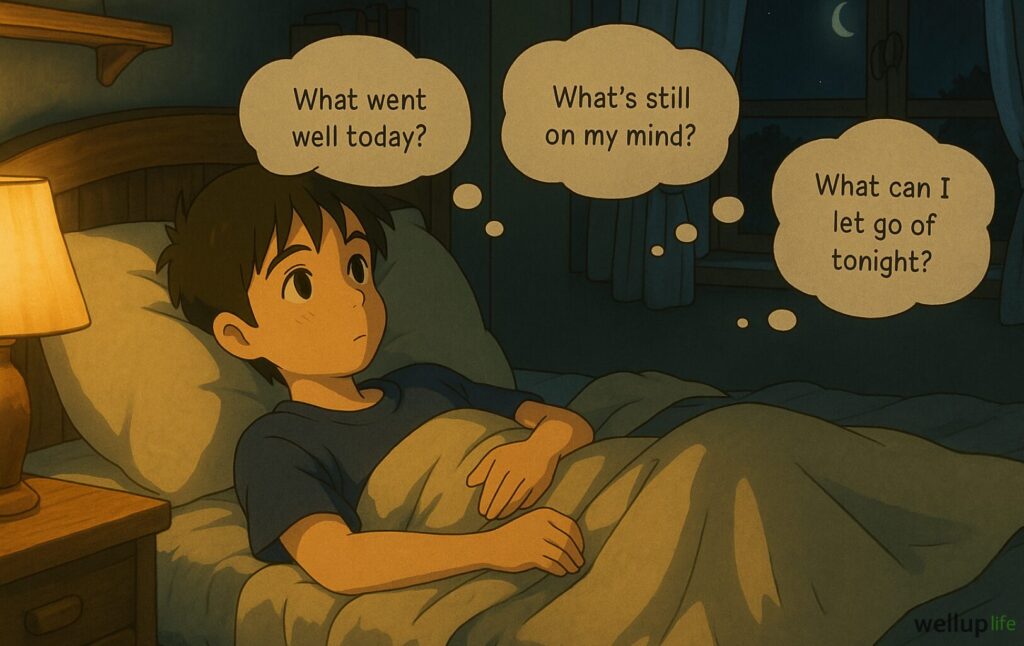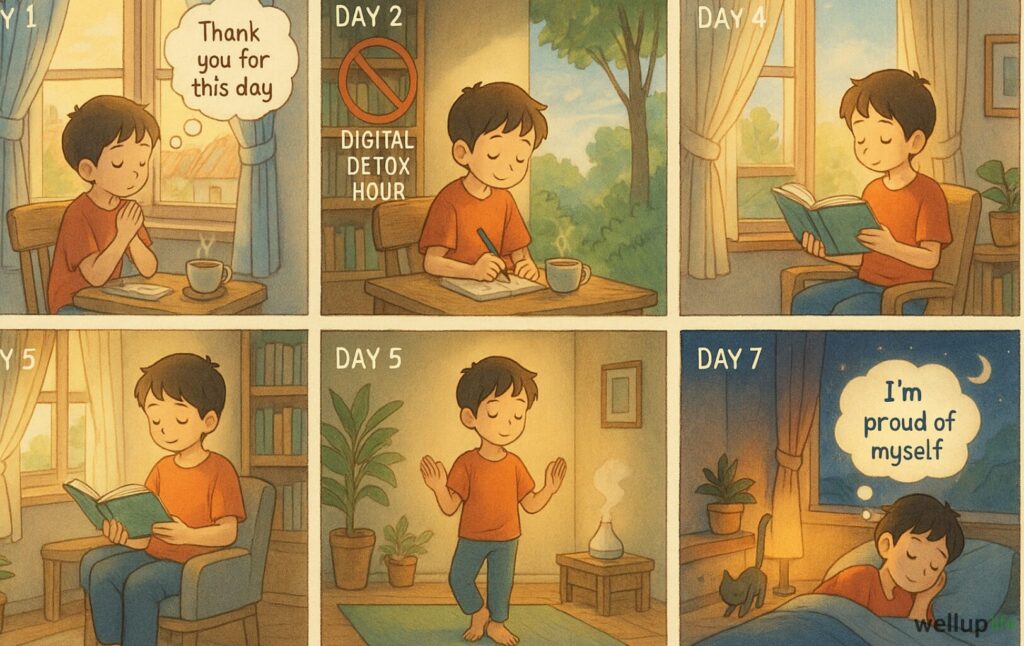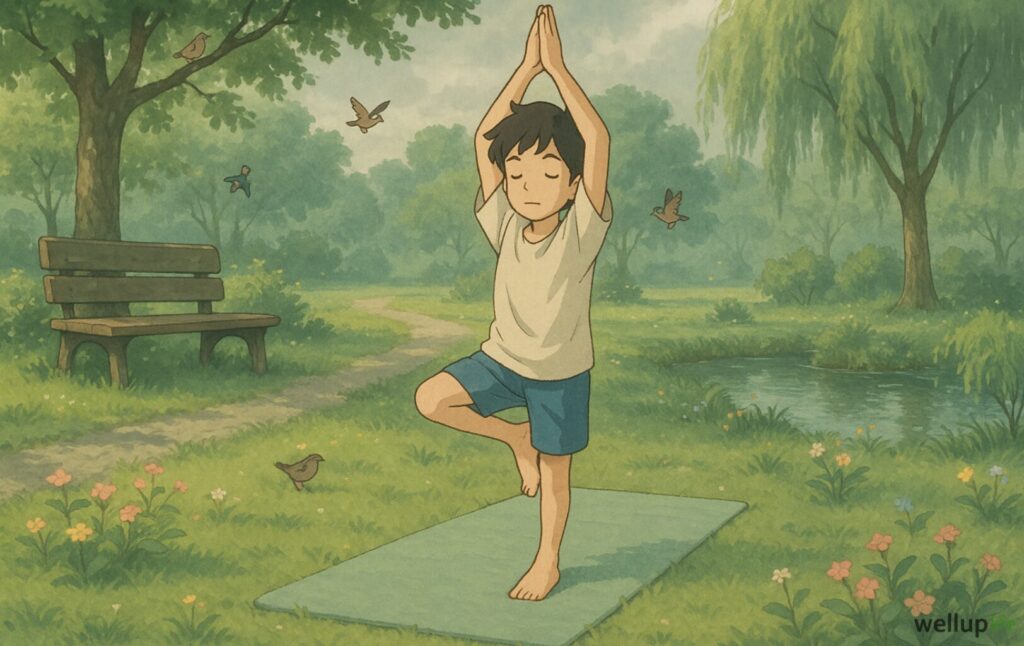Physical Address
304 North Cardinal St.
Dorchester Center, MA 02124
We independently evaluate and recommend products we believe will benefit our readers. If you purchase through links on this page, we may earn a commission.
Written By:

Published On: June 29, 2025
Last Updated On: December 17, 2025
Reviewed By:


I’ve always believed that how we start the day affects our whole day — and I’m sure you do too. We all want to wake up feeling refreshed, stay productive, and move through the day with energy and focus. That’s why most of us try to follow a morning routine. And honestly, we should — because the way we begin our morning does affect how the rest of the day unfolds.
But here’s something I’ve realized over time:
Even a perfect morning routine can’t save us from stress, distractions, or the pressure of a fast-paced life. Whether you’re a student, a working professional, or handling things at home by evening, we’re often tired, mentally scattered, and just… done.
Now let me ask you something:
Have you ever paused to think about your evening routine?
Do you wind down intentionally before bed?
Or do your evenings just slip away with your phone in hand or the TV playing in the background?
Be honest with yourself. I had to ask myself the same questions, too.
For a long time, I gave all my attention to how I start my day… but not much thought to how I end it. And that’s where I was going wrong. Because just like mornings are for setting the tone, evenings are for releasing stress, calming the mind, and preparing for deep rest.
The truth is: we can’t have a truly productive day tomorrow if we carry today’s stress into the night.
But the world we live in makes that hard. Our evenings often get lost in endless scrolling, replying to emails, or watching “just one more episode” until it’s way past bedtime. The result? Our minds stay overstimulated, our sleep suffers, and we wake up feeling more tired than before.
That’s when I started working on a simple yet intentional evening routine — and trust me, it made a big difference.
In this article, I’ll walk you through everything I’ve learned about creating a peaceful nighttime ritual. I’ll share how to quiet your mind, prepare for better sleep, and create a space where you can truly disconnect — so that your nights become as meaningful as your mornings.
Let’s build the 7 powerful evening routines that help you end your day with calm, clarity, and focus, no matter how chaotic and stressful the day was.
At the end of the day, we all need sleep — and not just any sleep, but deep, restful sleep. It’s more than just rest; it’s a time when our body heals, and our mind resets. In those quiet hours of sleep, we reconnect with ourselves. That’s when real recovery happens.
Think about the days you didn’t sleep well — you probably felt tired, dull, unfocused, maybe even moody. Your brain just doesn’t work at its best, and everything feels a bit harder. That’s how important sleep really is — it sets the tone for your entire next day.
That’s why having a proper evening routine matters.
An evening routine is simply a few intentional habits you follow at evening to help you relax, slow down, and prepare your mind and body for sleep. It’s your way of telling yourself, “The day is over — now it’s time to rest.”
Think of it like a cool-down after a workout — just as your muscles need to ease out of activity, your brain needs a gentle shift from “doing” to “resting.” An evening routine helps you do exactly that — calmly and mindfully.
Our brains love patterns and signals. Just like that one favorite coffee mug tells your brain it’s morning time, your evening routine acts as a quiet signal: “It’s time to slow down.”
According to psychologist Charles Duhigg, author of The Power of Habit, routines form what’s called a neurological loop. That means if you repeat certain actions — like stretching, reading, or journaling — your brain starts to connect those actions with relaxation.
Do it regularly, and your mind gets the hint faster. It begins shifting into the parasympathetic state — also known as “rest and digest.” That’s when your heart rate slows, your stress hormones drop, and your body starts preparing for real rest.
When you follow a structured evening routine, you’re not just forming a good habit — you’re also helping your body to manage stress. These evening routines lower cortisol levels (the stress hormone), clear mental noise, and soothe your nervous system.
In fact, research shows that simple bedtime routines can lead to:
In short, your brain craves rhythm and routine. When you give it consistent signals at night, it rewards you with deeper sleep, better recovery, and a clearer, more focused mind the next day.
When I come home from the office in the evening, I used to end my day with no real structure. No plan, no routine — just me, scrolling through Instagram or Snapchat, sometimes even after dinner. Other nights, I’d just crash into bed out of exhaustion. And every morning, I’d wake up feeling tired and off. Not fully rested. Mentally foggy. That’s when it hit me: how I ended my day was directly affecting how I started the next one.
So I decided to make a change. I started following a simple, intentional evening routine — and slowly, I began to notice the difference.
Now, I sleep more deeply. My mind feels calm, not filled with unnecessary late-night thoughts. No more overthinking or tossing and turning. I feel a quiet sense of peace within. And when I wake up, I’m fresh, focused, and full of energy — ready to take on the day.
I am sharing with you the biggest benefits I’ve experienced since I began sticking to an evening routine — and how it’s truly changed the way I live and feel:
Throughout the day, we collect little pockets of stress — a rushed deadline, emotional loads, a tough conversation, that never-ending to-do list. An evening routine gives you space to breathe, reflect, and release all that built-up tension. It’s like telling your mind, “It’s okay now. You’ve done enough.”
When your body follows a consistent pattern each night, it starts to recognize the signals: “Time to rest.” Your mind winds down, and your sleep becomes deeper, self-connecting, and more restorative. No more tossing and turning or waking up still feeling tired.
Ever tried sleeping with a busy mind? It’s hard. But when you journal, meditate, or even just sit in silence for a while, your thoughts begin to slow down. You don’t carry your day’s noise into your sleep — instead, you enter it with a lighter, clearer head.
One of the most powerful changes I noticed after starting an evening routine was the shift in my mental and emotional health. I didn’t expect it at first, but the more I stuck to a calm nighttime rhythm, the more I started feeling mentally balanced and emotionally grounded.
In our busy lives, our minds are constantly running — switching from one task to another, worrying about tomorrow, or replaying the stress of the day. Without space to pause, these thoughts pile up, leading to anxiety, irritability, or emotional burnout.
But an evening routine gives your mind something it deeply needs:
a break.
Taking just 30–60 minutes to slow down, unplug from the noise, and connect with yourself — whether that’s through journaling, light reading, meditation, or a warm shower — can create emotional space. That space helps you process the day, release tension, and bring more peace into your mind.
Over time, I began to feel less anxious, more in control of my emotions, and much more in tune with myself. And it all started with giving my mind the care it truly deserves, at the end of each day.
So if you’re feeling overwhelmed, mentally drained, or emotionally out of balance, try ending your day more intentionally. Your mind will thank you for it.
Here’s the best part: when you sleep well and end your day with intention, your mornings feel lighter. You’re not dragging yesterday’s stress into today. You wake up with more clarity, better focus, and a stronger sense of purpose.
Honestly, an evening routine isn’t just about sleep — it’s about ending your day with peace, and starting the next with power.
Your productivity doesn’t just depend on how hard you work during the day — it depends on how well you wind down at night. If your mind is still holding onto stress or mental clutter, it’s hard to rest properly. And without quality sleep, your focus and energy the next day take a big hit.
That’s where a structured evening routine helps. It gives your body and mind a chance to release stress, let go of fatigue, and shift into rest mode. It gently prepares you for a night of deep, restorative sleep — the kind of sleep where your body heals, your mind resets, and your energy is fully recharged.
When you sleep deeply, you wake up feeling fresh, focused, and calm. Your brain is sharper. Your energy is steady. And you’re able to tackle your day’s tasks with clarity and confidence.
So if you want better results and higher performance during the day, start by taking care of your nights.
Ending my day with peace has become one of the most important parts of my life. In the evening, my only focus is on how to unwind from the things that happened throughout the day. In previous years, before following any evening routines, I used to scroll social media and fall asleep with my phone in hand, thoughts spilling, and a messy evening with no structured routine. It left me feeling restless at night and sluggish in the morning.
But once I started building an intentional evening routine, everything shifted — my sleep improved, my mind became clearer, and I started waking up with more energy and purpose, and I am now much more productive than earlier.
Here’s the routine I now follow to wind down my day and prepare for restful sleep and a focused tomorrow:
I used to think checking one last message or scrolling Instagram wouldn’t hurt. But I didn’t realize how badly screens were messing with my sleep. The blue light from phones and laptops delays melatonin — the sleep hormone, and keeps your brain wired when it should be winding down [2]Harvard Health Publishing. (2024). Blue light has a dark side..
Now, I make it a rule: no screens one hour before bed. It’s tough at first, but the mental clarity it brings is worth it.
What I Do:
I used to eat dinner pretty late — sometimes right before bed — and often it was heavy or oily food. I didn’t realize it back then, but that habit was silently messing with my sleep. After dinner, instead of feeling relaxed, I’d feel bloated, uneasy, and restless. Lying down right after a heavy meal would make my stomach feel heavy and my mind feel unsettled [3]St-Onge, M.-P., et al. (2016). Meal timing and frequency: Implications for cardiovascular disease prevention. Circulation..
But then I made a small change: I started eating lighter meals at least 2 to 3 hours before bedtime, with less oil, spice, or sugar. I also added a cup of warm herbal tea right after dinner.

The result? Total game-changer.
Now, I feel light, calm, and relaxed before bed. No more bloating. No more tossing and turning. That simple shift made my sleep deeper, my digestion smoother, and my nights more peaceful.
It’s amazing how such a small change in your evening routine can have such a big impact on your body and mind.
What Works for Me:
This one changed my mental space completely. I’d go to bed with my mind racing, full of random, scattered thoughts. Sometimes, the overthinking was so intense, it would even give me a headache.

But now, I take just a few minutes before sleep to reflect on my day. I ask myself simple questions like: What went well? What bothered me? What can I let go of?
This small act of journaling helps me process the day, release emotional build-up, and gently close those mental tabs [5]Smyth, J. M. (1998). Written emotional expression: Effect sizes, outcome types, and moderating variables. Journal of Consulting and Clinical Psychology..
It’s like emptying my mind onto paper so I don’t carry it into sleep. And the result? I sleep with a calmer, clearer mind — light, relaxed, and at peace.
How I Do It:
I write just 3–5 sentences answering:
It doesn’t have to be perfect or poetic. Just honest. And it truly helps.
This is honestly one of my favorite parts of my evening routine. Every night, I take a few minutes to gently stretch my body and practice some slow, mindful breathing.
Our bodies hold on to the stress of the day, especially in the neck, back, and shoulders. I didn’t realize how much tension I was carrying until I started doing this regularly.

Just a few simple stretches and breathwork exercises help me release that built-up tension and slowly shift into a calm, relaxed state. It feels like I’m telling my body, “It’s okay to rest now.”
And the best part? It works — both physically and mentally [6]How Breath-Control Can Change Your Life: A Systematic Review on Psycho-Physiological Correlates of Slow Breathing.
Stretches I Love:
Breathing Technique I Use: 4-7-8 Method
This simple routine makes me feel lighter, both physically and mentally. Below, I am attaching a video, which will help you with gentle stretching before bed.
Note: Stretching exercises may be different from mine, but they’re also effective.
I used to overthink everything — replaying the whole day in my mind, worrying about what I said or didn’t say, what went wrong, and what I should’ve done differently. Eventually, I realized something important: overthinking wasn’t solving anything — it was only making things worse.
So I decided to change that.
I made it a habit to let go of what’s already happened, because the truth is, no amount of mental energy can change the past. And using up my peace to relive things I can’t control? It just didn’t make sense anymore.
Now, instead of spiraling into overthinking, I reflect on the lessons from the day and set clear intentions for tomorrow. I simply write down what I want to get done, what matters most, and what I can release from my mind.
This small shift has made a huge difference. It clears my head, eases mental tension, and helps me sleep with a calm, focused mind, not one stuck in a loop of unfinished thoughts.
My Simple Plan:
This habit has helped me wake up with direction and purpose, not anxiety.
This has become one of my favorite parts of winding down. Just a few drops of essential oils like lavender or cedarwood in an Ultrasonic Essential Oil Diffuser change the entire mood of my space. The scent alone sends a signal to my brain that it’s time to relax [7]Koulivand, P. H., Khaleghi Ghadiri, M., & Gorji, A. (2013). Lavender and the nervous system.. Aromatherapy isn’t just about fragrance — it activates brain pathways that promote calmness and prepare the body for rest.

What I Do:
Some nights, I simply close my eyes and mentally list the things I’m grateful for. Other nights, I write them down in a notebook. It may seem like a small habit, but it’s had a huge impact on my emotional well-being.
The moment you start practicing gratitude, something shifts — you begin to accept and appreciate the life you already have. Most of us spend our days noticing what’s missing or what’s going wrong. But when you focus on what’s right, you stop complaining and start feeling more content, peaceful, and present.

Practicing gratitude before bed helps me end the day on a positive note. It gently pulls my mind away from stress or worries, and helps me sleep with a sense of peace and emotional balance [8]Emmons, R. A., & McCullough, M. E. (2003). Counting blessings versus burdens: An experimental investigation of gratitude and subjective well-being in daily life..
What I Do:
While a good evening routine is essential, I’ve learned that your sleep environment matters just as much. Small changes in your bedroom and habits can make a big difference in how deeply and peacefully you sleep.
Here are a few personal tweaks I’ve made that noticeably improved my sleep quality:
These small but mindful adjustments have helped me fall asleep faster, stay asleep longer, and wake up feeling more refreshed. If your sleep still feels off despite your routine, start by checking your environment — sometimes, it’s the little things that make the biggest difference.
The way you end your day is more powerful than you might think. It’s not just about brushing your teeth and turning off the lights — it’s about how you choose to let go, recharge, and reset.
For the longest time, I didn’t give my evenings much thought. I’d scroll through my phone, carry the day’s stress into bed, and wonder why I felt so tired every morning. But once I started building a simple, mindful evening routine, everything began to change. My sleep improved, my mind became calmer, and I began waking up with more clarity, energy, and purpose.
Here’s the truth:
You don’t need a perfect routine. You just need one that feels intentional, soothing, and sustainable. Even the smallest habits — like putting your phone away, drinking a cup of herbal tea, or writing down what you’re grateful for can create space for deep rest and emotional peace.
So tonight, give yourself the gift of a gentle wind-down.
Because when you close your day with care, you open the next with strength.
We are what we repeatedly do. Excellence, then, is not an act, but a habit.
 — Aristotle, Polymath
— Aristotle, PolymathRead Next: How to Build a Morning Routine for Productivity and Happiness in 2025
Stoic Thinker
Nitin Yadav, Editorial Director and Review Board Member at Wellup Life, is a Stoic thinker who inspires personal growth through resilience, discipline, and clarity.

Reviewed By:


Reviewed By:


Reviewed By:


Medically Reviewed By:


Reviewed By:

Wellup Life is your space for personal growth, wellness, and mindful living. From self-improvement and productivity to spirituality and relationships, we share practical insights and timeless wisdom to help you live with clarity, balance, and purpose.
Copyright © 2024 – Wellup Life — All rights reserved
